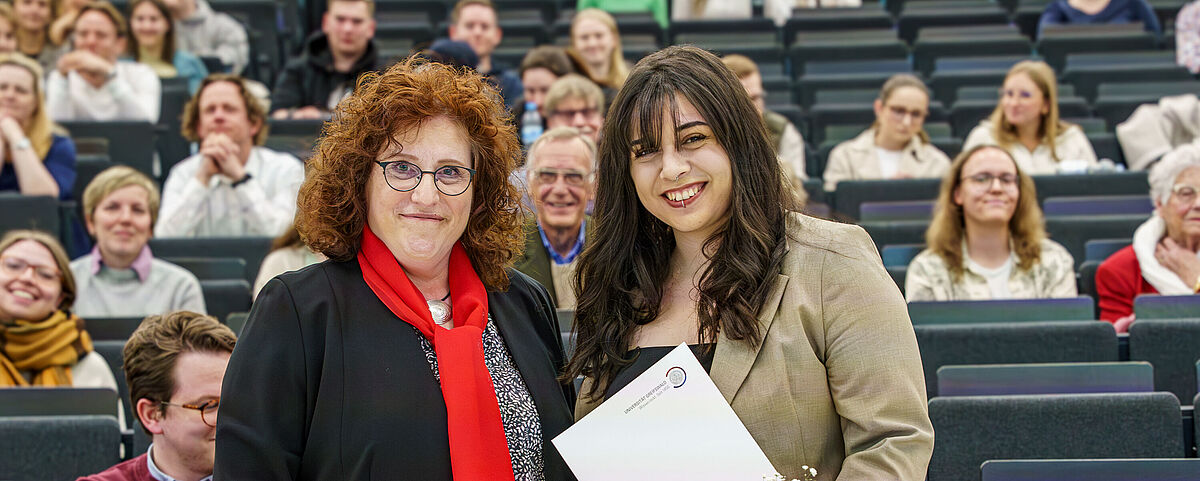
DAAD Prize
The University of Greifswald awards the DAAD Prize to exceptional international students or doctoral students, who have distinguished themselves through excellent academic achievements and notable social work or intercultural activities.
The DAAD Prize has been awarded for over ten years now and comes with prize money of €1,000 per university. The aim is to give faces to the many international students at German universities and link them with their stories. This illustrates that each international student takes a piece of Germany back to their homeland when they return and also leaves something of themselves in Germany – thus enriching both sides.
Requirements
- You are a foreign student and enrolled at the University of Greifswald and have obtained good or very good marks
- Your primary residence is in Germany
- You are at an advanced stage of your bachelor’s degree course (at least 2nd or 3rd year of study) or master’s degree course (at least 2nd semester).
- You take part in community work
- Furthermore, former students, who have recently graduated (i.e. graduation is usually no more than 3 months ago), and doctoral students can also apply
Current DAAD Prize Winner: Yaiza Otero
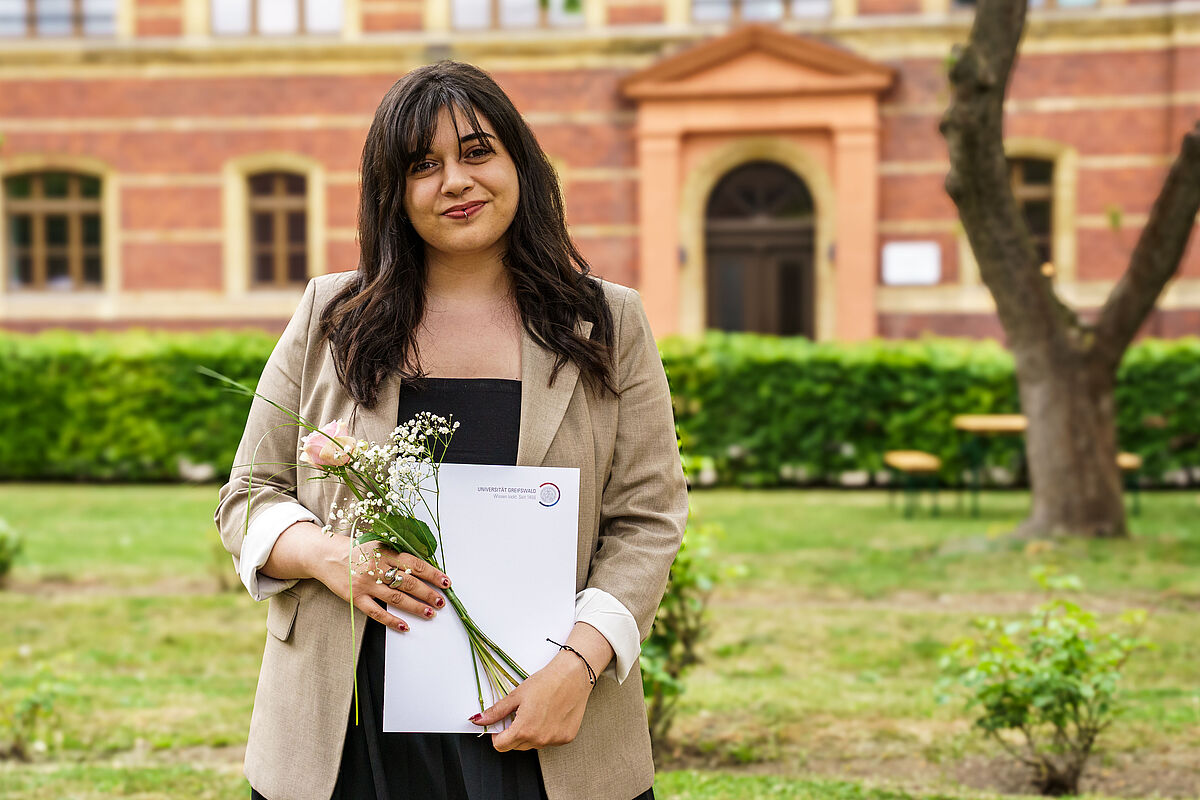
The University of Greifswald has awarded this year’s DAAD Prize for the excellent achievements of an international student to Yaiza Otero, a master's student in German Literary Studies. With this prize, the University honours not only her excellent academic achievements, but also her impressive social and intercultural engagement on campus and beyond.
Since she arrived in Greifswald, Ms. Otero has helped to shape the university and the town far beyond her studies. In her application for the prize, she emphasises that she not only sees Greifswald as an academic location, but as a second home - a place she brings life to. Her work as a graduate assistant at the Interdisciplinary Centre for Baltic Sea Region Research (IFZO) and her activities at the Interdisciplinary Centre for Gender Studies (IZfG) bear witness to her commitment to research, science communication and interdisciplinary exchange. Her tasks at the IFZO include organising international conferences and looking after the Centre’s social media channels – an important contribution to the visibility of the research performed at the University and in the surrounding region.
Her involvement at the IZfG also reflects her academic maturity and her commitment towards gender equality and diversity. She has co-organised workshops, taken part in international events and is currently preparing a talk on the topic of “Feminist Cringe Comedy” that she will hold at the conference “UEBER CRINGE. Ambivalent Affects and Everyday Aesthetics” at the University of Heidelberg in summer.
Her master’s dissertation approaches the depiction of abortion and narrated silence in German contemporary literature – a topic that is yet to have seen much research and to which she brings new insights through her perspective.
In addition to her academic success, Ms. Otero is an active networker and someone who helps to shape the university community. Her voluntary work as a “Local Buddy” at the International Office underlines how important intercultural exchange is to her and is an expression of her desire to help other international students settle in in Greifswald. As the organiser of a Stammtisch (regulars’ table) for master's students in literary studies, she has created a space for exchange and mutual support, where she is also able to bring in her own experience from her previous participation in the mentoring programme “Graduates Interested in Doing a Doctorate” - for example with regard to networking in academic settings. Furthermore, she plays an active role in the forum “Feminism and Pop Culture” at IZfG, where current topics from the realms of film, literature and social media are discussed. Her contributions enrich the discussions from intercultural and literary studies perspectives.
Ms. Otero is also strongly dedicated to the community outside of the university: as an active member of Greifswald’s Animal Welfare Association, she helps animals in need on a weekly basis – a commitment that impressively demonstrates her solidarity with the town and her social environment.
By awarding the DAAD Prize 2025 to Ms. Yaiza Otero, the University of Greifswald honours a young woman who embodies interculturalism, academic excellence and social responsibility. Ms. Otero’s academic background and her broad commitment make her an outstanding ambassador for the University and a promising candidate for a future doctorate in the field of literary studies and gender research.
Prize winners from previous years
Devu Mahesan (2024)
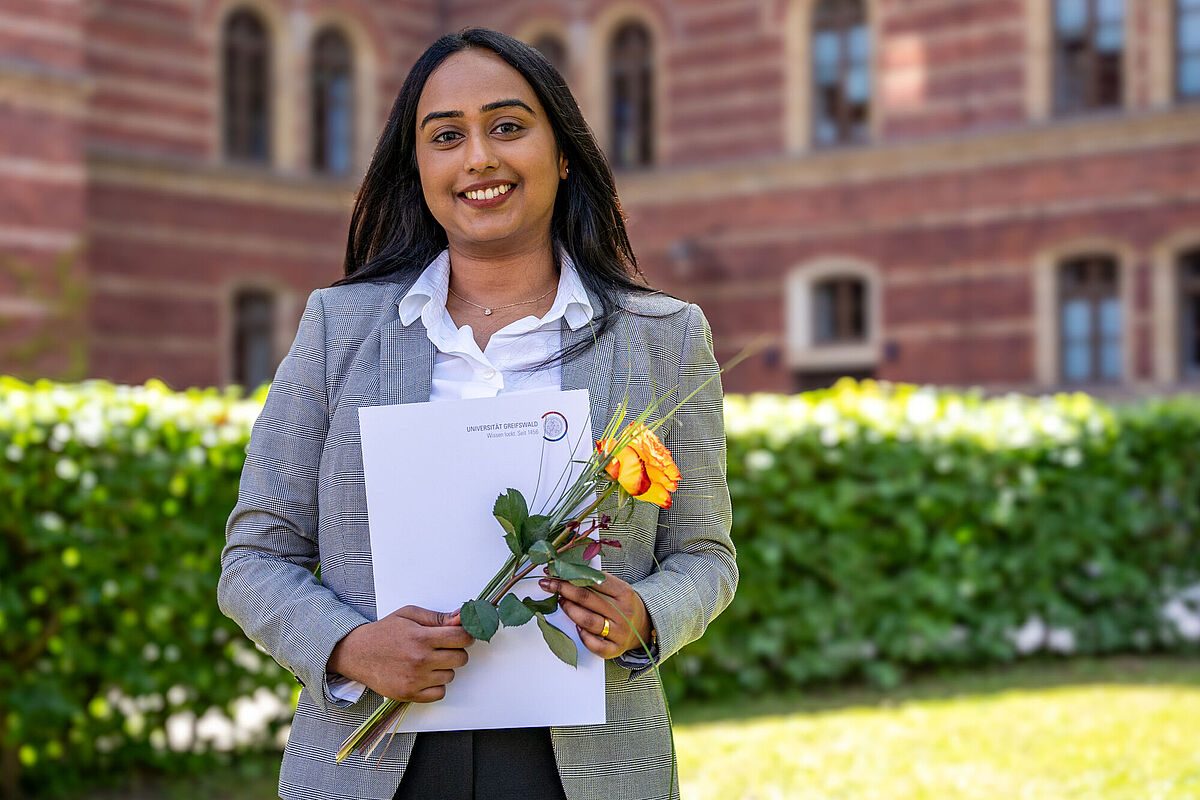
Doctoral candidate Devu Mahesan from India has received the 2024 DAAD Prize from the University of Greifswald. The prize, worth 1,000 euros, was presented by Pro-Rector Dorthe GA Hartmann on 29 May 2024, as part of the Dies academicus. The award from the German Academic Exchange Service (DAAD) honours international students who have demonstrated outstanding achievements on both an academic and at a community level.
Devu Mahesan, this year's award winner, is distinguished not only by her remarkable achievements in research, her commitment to teaching and her active social engagement, but also by her interdisciplinary scientific background. As a doctoral student at the University of Greifswald in the field of cognitive psychology, she combines her expertise from the fields of cognitive science and data analytics to research control processes in human behaviour. Her role in planning and organising conferences at the Institute of Psychology is particularly noteworthy. Initiated by Devu Mahesan, the annual doctoral workshop "ADok" took place for the first time in Greifswald in 2023.
In her role as a lecturer, Devu Mahesan holds her seminars in English and uses her interdisciplinary approach to teach bachelor's and master's students in a practice-oriented and interactive way. She works together closely with her colleagues and brings in her international experience to promote cultural exchange among students. Her passion for teaching and mentoring is also evident in her supervision of bachelor's and master's dissertations and in leading a team of several student assistants.
"I am extremely proud of Ms. Mahesan, who not only shines through her impressive academic achievements, but also through her tireless social commitment. She is passionate about intercultural projects and initiatives in our region that promote acceptance and reduce prejudices," acknowledges her supervisor, Prof. Dr. Rico Fischer.
Devu Mahesan is not only active in the academic world, but is also strongly involved in social and cultural projects. Her passion for imparting knowledge is not something she has only recently pursued: in her home in Kerala, South India, and during her studies in Mumbai, she was involved in various charitable projects, such as the Nyasa Foundation and the Akansha Foundation, where she taught socially disadvantaged students mathematics, science and English. This commitment has continued to this day. Devu Mahesan currently works for the Renuka’s Mathematics Centre in Kerala and provides students with advice and support online, be it with her specialist knowledge of psychology during stressful school phases or with her professional experience when it comes to questions about study advice. As an active member of MalluGreifs, a community that organises cultural events to celebrate the rich culture of Kerala, she reaches people in Greifswald beyond the international community. Learning from each other in intercultural exchange is particularly important to her. She is also involved with Jience, a platform that promotes fair and bias-free science by optimising application processes. Here, she contributes to promoting diversity and inclusivity with research-based findings and psychological perspectives.
She plans to continue to her professional commitment in the future and, in her role as a researcher, to inspire young people to become interested in science.
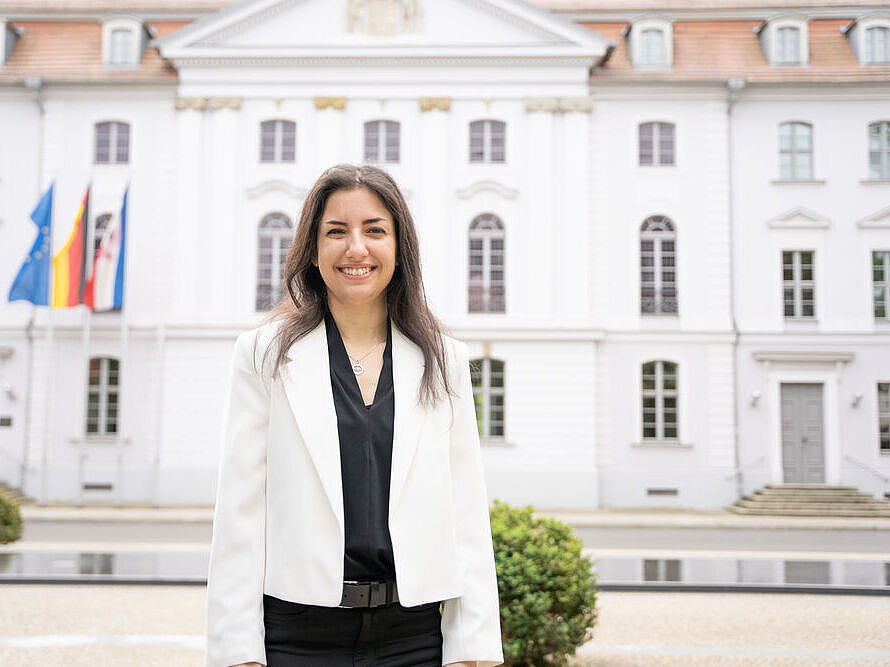
The doctoral candidate Diclehan Ulucan from Turkey has been awarded the University of Greifswald’s DAAD Prize 2023. The prize, endowed with 1,000 euros, was presented by Dorthe G. A. Hartmann, the Pro-Rector for Teaching, Teacher Training and Internationalisation during the dies academicus on 24 May 2023. The prize from the German Academic Exchange Service (DAAD) honours international students, who have accomplished outstanding achievements both in their studies and in community efforts.
Diclehan Ulucan, this year's DAAD prize winner, has had a major ambition from the very beginning of her studies: to excite people for science and make it more accessible to them. She became interested in the natural sciences at an early age; a biology teacher later sparked her enthusiasm for technical developments, especially in the fields of electrical engineering and artificial intelligence. During her bachelor's degree at Izmir University of Economics in Turkey, she already placed importance on making science and its current developments accessible to people, because not every person who is interested also has access to a structured formal education. To actively contribute towards this intention, she translated articles into Turkish for the Popular Science Turkey Magazine for several years.
Since 2021, she has been working on her doctorate in the field of intrinsic image decomposition and image generation under the supervision of Prof. Dr. Marc Ebner at the University of Greifswald’s Chair of Computer Science - with great success. As a result, she was able to present her research results at the IEEE International Conference on Image Processing in 2022 and gave international presentations on two of her publications in April 2023, which were also nominated for the Best Student Paper Award. Whilst completing her doctorate, she also passes on her enthusiasm for electrical engineering and artificial intelligence to those interested all over the world by providing free online workshops as a member of the Global AI Hub.
A matter close to Diclehan Ulucan's heart is raising the visibility of women in MINT disciplines. As head of the Creative Development Department of Freiraum, a magazine by scholarship holders and alumni of the Friedrich Naumann Foundation for Freedom, she not only reports on relevant topics and projects that aim to increase the representation of women in MINT disciplines, but also personally organises specific events in this field.
It is particularly important to her to directly support and encourage female early-career researchers to take an interest in the natural sciences: as a mentor in one of the largest online mentoring programmes for girls in MINT disciplines, CyberMentor, as of this year, she is mentoring schoolgirls who are interested in this field of study. "I am delighted that I am now viewed as a role model and I enjoy being able to give something back," says Diclehan Ulucan.
She aims to continue her commitment in her future career and would like to become a professor and inspire young people for science.
The University wishes the prizewinner every success and the very best for the future!
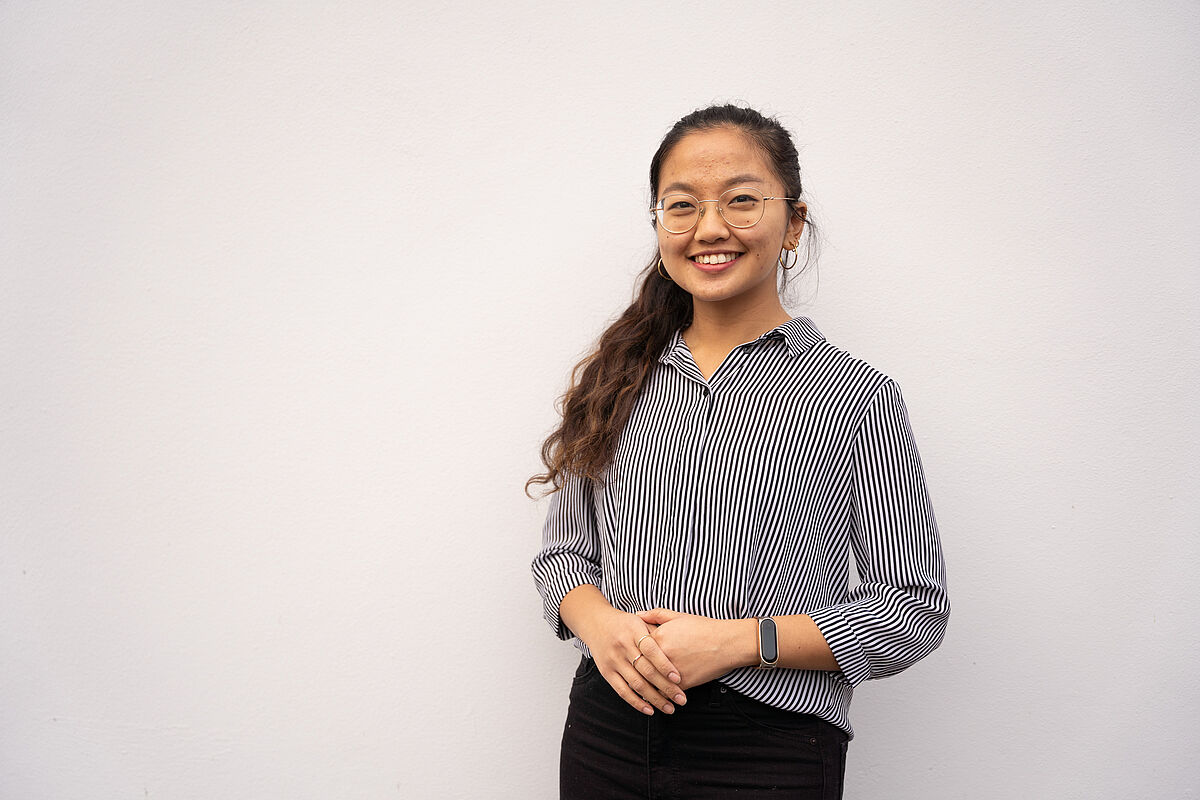
Adventina Padmyastuti has been interested in natural sciences since her childhood. From an early age onwards, she took pleasure in digesting encyclopaedias and enjoyed visiting natural history museums. She was particularly fascinated by the complexity of the human body.
This interest and her desire to study in Germany led her to the University of Greifswald. Whilst visiting the preparatory courses in Hanover to prepare her for studies in Germany, she worked as an assistant nurse to further consolidate her knowledge. The direct contact with patients strengthened Adventina’s desire to study medicine.
She has been studying Human Medicine at the University of Greifswald since winter semester 2018 and working on an experimental doctoral thesis on the topic of prostate cancer (Investigation of Circulating MicroRNAs as Biomarkers for Prostate Carcinoma Using a Microphysiological System) in the research laboratory of the Clinic and Polyclinic for Urology at University Medicine Greifswald since October 2021, where she is supervised by Prof. Dr. Burchardt and Dr. Pinto.. She was honoured for her laboratory work and received a scholarship from the German Society for Hematology and Medical Oncology (DGHO). This has made it possible for her to interrupt the clinical phase of her studies and to devote herself fully to her research. She was able to present some of her work at the DGHO’s annual conference in 2022. Alongside her studies and research, Adventina is also a student assistant at a prenatal diagnostics practice and she passes on her knowledge to her fellow students as a tutor for medical biochemistry.
‘By studying medicine, I would like to contribute towards the realisation of a better future. I felt compelled to take on social responsibility and play a part in shaping society from early on,’ explains Adventina Padmyastuti. Already at the age of 14, she became a UNICEF Youth Ambassador and chairperson of the children’s forum in her home town Salatiga. In this position, she visited schools and raised awareness for children’s rights, collected donations for orphanages and advocated the development of a child-friendly city. At the same time, she gave lessons to needy children and ran a public library in her neighbourhood.
Following her arrival in Germany, she continued her voluntary work, supporting refugees in Hanover and organising an intercultural café. In Greifswald, Adventina took part in a children’s holiday club, supported international students on arrival to Greifswald as a Local Buddy and joined the university’s UNICEF society, which she now chairs. Adventina would now like to complete her specialist training and then plans to help install and support aid projects for children in her home country.
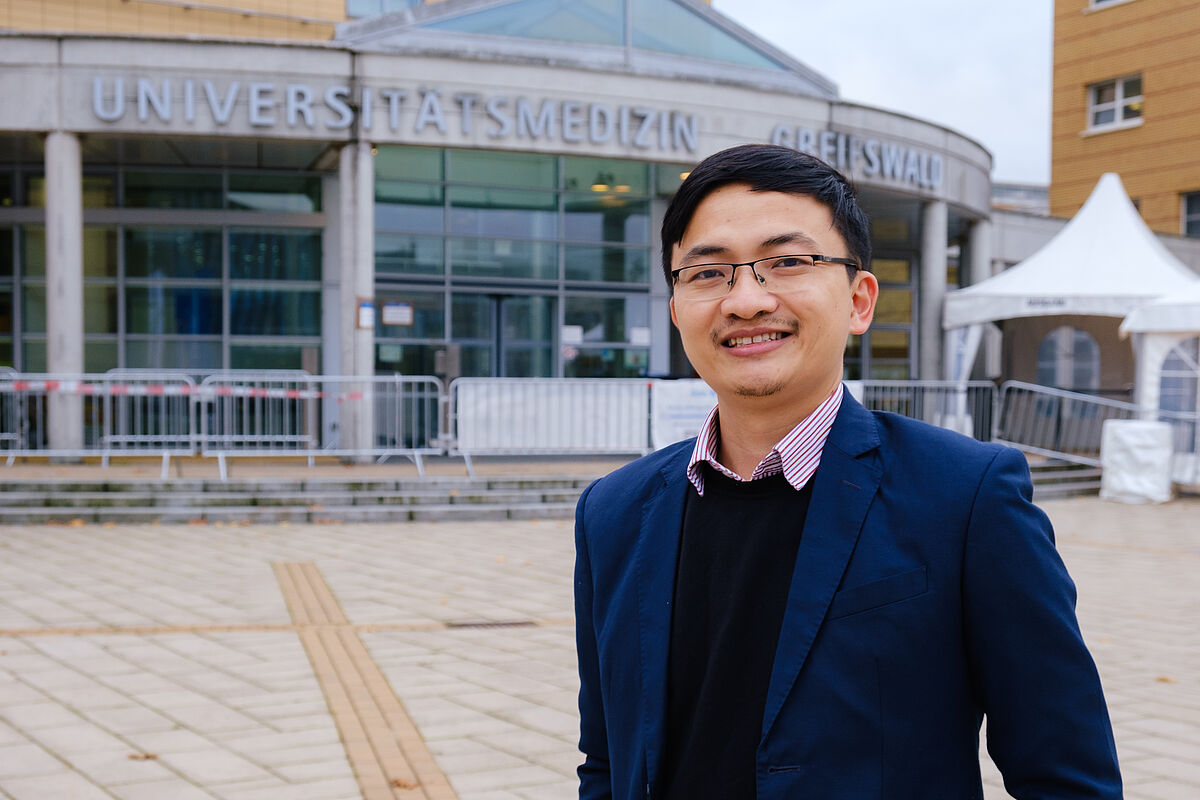
The winner of this year’s DAAD Prize is PhD student Quang Trung Tran from Vietnam. The prize from the German Academic Exchange Service (DAAD) honours international students, who have accomplished outstanding achievements both in their studies and in their community work and/or through their social commitment. The prize was awarded by the University of Greifswald’s Pro-Rector for Teaching, Teacher Education and Internationalisation, Dorthe G. A. Hartmann, during the ‘Academic Career Day’ which was hosted at the Alfried Krupp Institute of Advanced Studies in Greifswald on 23 November 2021.
Tran studied Medicine with a specialisation in gastroenterology at the Hue University of Medicine and Pharmacy in Vietnam. As a result of the cooperation agreement between the Hue University and the University of Greifswald, Dr. Seiberling, Head of the University of Greifswald’s Research Support Centre, introduced the student to his later PhD supervisor, Prof. Dr. Lerch from University Medicine Greifswald. Following his studies, the talented young man consolidated his skills and knowledge of gastrointestinal endoscopy in Japan. Thanks to the DAAD’s research grant programme, the early-career researcher received the opportunity to commence his PhD studies in the field of gastroenterology in Greifswald in 2018. Prior to moving to Greifswald with his family, he spent three months learning German in Berlin. He is currently learning medical terminology in a German language tutorial provided by University Medicine.
It did not take long for the newcomer to become a valued member of Greifswald’s Vietnamese community. When Vietnam was hit by flooding, landslides and flash floods, he got involved in collecting donations for his home country. At the beginning of the COVID-19 pandemic, the young doctor mobilised his Vietnamese community to sew face masks from materials that were financed by the campaign ‘I protect you - You protect me’ organised by Save the Kidney Nordverbund Niere. These masks were donated to hospitals, care homes and the fire service in Wolgast, Neubrandenburg and Greifswald to protect the emergency service, nursing and care staff. Furthermore, with help from Prof. Nicole Endlich, the committed young man approached Mecklenburg-Vorpommern’s State Government to ask them to advocate Germany’s provision of urgently required vaccine to fight SARS-CoV-2 in his home country. Minister Pegel took up on this request and approximately two weeks later, the Federal Government decided to donate 2.5 million vaccinations to Vietnam. On top of all that, the doctor cares about the training of young medical staff. He organised a charity scholarship fund that provides rent supplements to students lacking sufficient financial means.
Tran stresses he considers it important to set himself goals that he can work toward. That’s why he enjoys taking on new challenges, which he approaches with dedication. He has set himself a clear mission: Apart from his own personal development, he is passionate about what he can do for society.
His expertise as a researcher is in demand on an international level, e.g. at congresses in Asia and Europe. He held two presentations at the ‘Asian Pacific Digestive Week’ in October 2021. Having been invited to take part at the Masterclass of United European Gastroenterology as one of the 40 best candidates and as a young researcher at the ‘Lindau Nobel Laureate Meeting’, he will also be taking part in conferences in November and December.
Tran’s doctoral supervisor, Prof. Dr. Lerch, describes him as ‘particularly talented, motivated and committed’. In spite of his full work schedule and his community work, the committed doctor also lends importance to a healthy work-life balance. He spends as much time as possible with his family. His two children are very fond of nursery and school here in Greifswald.
Following completion of his doctorate, Tran would like to return to Vietnam with his family. There, he would like to bring in his experience and expertise and share his knowledge with Vietnamese doctors and students. ‘Thanks to my studies in Germany, I have been much luckier than others,’ says Tran, ‘and that’s why I carry a greater responsibility.’
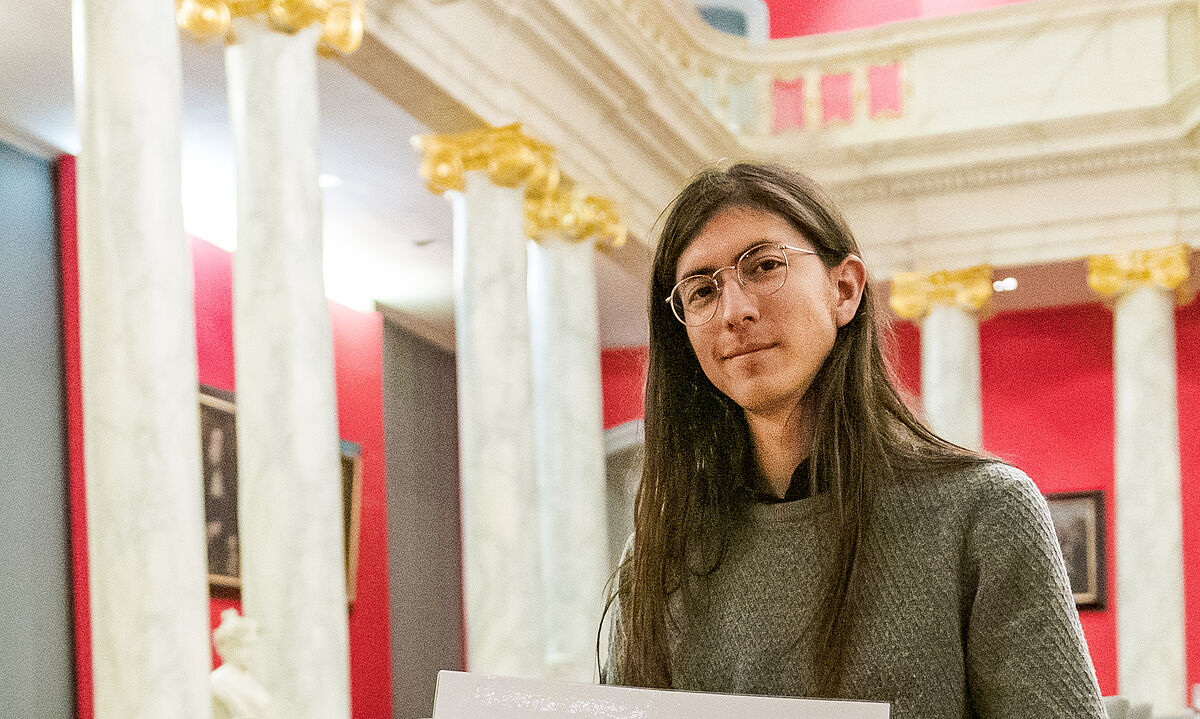
Gonzalo Landau stood out from the other applicants due to his successful studies, his community work and personal authenticity. He grew up in Panama. After completing secondary school, he worked as a town and tour guide and discovered his great interest in history and his enthusiasm for teaching things to others. Gonzalo Landau has successfully been studying to become a teacher of history and German at Gymnasien (grammar schools) since 2017. He obtained the required qualifications at Greifswald’s own Studienkolleg (Preparatory Courses) on the arts and humanities course, which he completed with very good marks. There, he was also able to further his excellent command of German. The Studienkolleg supported Gonzalo Landau on his chosen path and it enabled him to meet people from all over the world, and from Greifswald.
Due to his excellent study achievements, Gonzalo Landau was selected to work as a student assistant at the Department of History, providing tutorials on an introduction to historical studies and ancient history, courses that he greatly enjoys planning and holds independently. This position provides him with the opportunity to prove not only his subject expertise, but also his teaching skills. During his studies, his research interests have been based above all on modern Spanish history and ancient Rome. Various excursions have already taken him not only to the Hanseatic towns of Stralsund and Lübeck, but also as far away as Lisbon and Novgorod.
His community work also makes him stand out from the crowd. Gonzalo Landau capitalises on his huge interest for languages, providing after-school help in English, Latin and Spanish, his native language. Furthermore, he has volunteered in the field of media education at the ComputerSpielSchule Greifswald (CSG) since his third semester of studies. He considers his own education at a grammar school that specialised in information technology to be particularly useful for this work. The things he likes most about his work at CSG are the freedom he is given to develop own educational projects and the resulting responsibility.
And where does Gonzalo Landau see himself in the future? ‘Greifswald was and will remain the place where I was able to develop the person I am today. The town’s active offers have also made it possible for me to keep up with my musical skills, allowing me to make valuable new friends with whom I play in a band or am able to relax. As I have now met so many people in this town – whether during teaching activities or whilst playing music with my friends – I would be delighted to continue my teaching on the Baltic Sea coast and to share a morsel of the world with the people living here.
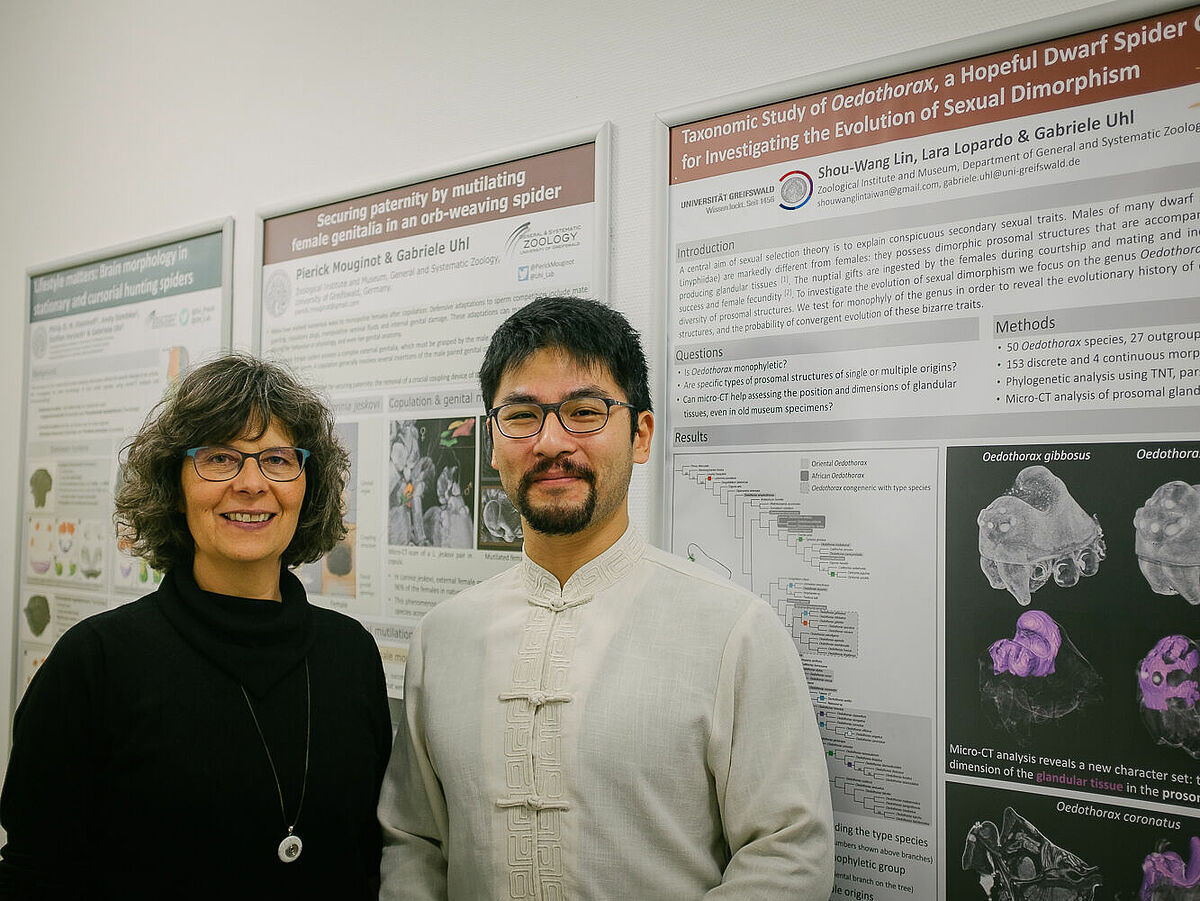
The doctoral candidate Shou-Wang Lin stood out due to his academic success, integrative competence and personal authenticity. Shou-Wang Lin is completing his doctorate on the topic of the evolution of dwarf spiders at the chair of General and Systematic Zoology at the University of Greifswald’s Zoological Institute and Museum. His work is making an important contribution toward the knowledge of Asian spider biodiversity. His research is also providing him with in-depth knowledge of phylogenetics, high-resolution micro-computed tomography and differentiation of species using mitochondrial DNA sequencing. His supervisor Prof. Dr Gabriele Uhl confirms: ‘Several prizes at scientific conferences are evidence of his impressive scientific achievements.’ However, Shou-Wang Lin didn’t just convince the jury with his academic accomplishments. His high level of personal engagement in Greifswald also caught the jury’s eye.
After arriving in Greifswald in 2014, Shou-Wang Lin first tried to concentrate on his research. However, it didn’t take long for him to realise that he needed contact to other people in a town that was completely new to him. He then decided to turn to Greifswald’s protestant community where he was welcomed with open arms. Although at first Shou-Wang Lin was not able to take part in all of the discussions held in German, he kept positive and decided to teach German to the community’s asylum seekers from Afghanistan. This transformed him into a mediator between the German education system and asylum seekers who had recently arrived. His German and English language skills are now excellent.
Shou-Wang Lin is also involved in several other charitable projects in Greifswald. For example, for two years he has been looking after children from the Schönwalde district as part of the church’s creative week, with activities such as arts and crafts, fun and games and Kung Fu. Mr. Lin also teaches a Kung Fu course at University Sport, which he sees as an opportunity for crossing cultural boundaries. During the Chinese New Year festivities in Greifswald and Stralsund, and at other events, Shou-Wang Lin shares aspects of his Taiwanese culture together with Greifswald’s Chinese community.
His decision to help integrate people from other cultures into life in Germany and Greifswald bears witness to his own integration: ‘I sometimes feel that everyone has their own burden to carry in life and that this can be hard to understand or overwhelming for others. But when I think of my friends and the time we have spent together in Greifswald, I am certain that in spite of our different backgrounds and experiences, we still have lots of similarities and that one person’s burden can be shared by someone else.’
Due to his personal and academic experience, Shou-Wang Lin has gained an open-mindedness that is shown in various different ways: Through his contact with other cultures in the community, through his excellent command of German, and through his engagement in the community and academic world. After completing his doctorate, Shou-Wang Lin would like to stay and work in Greifswald.
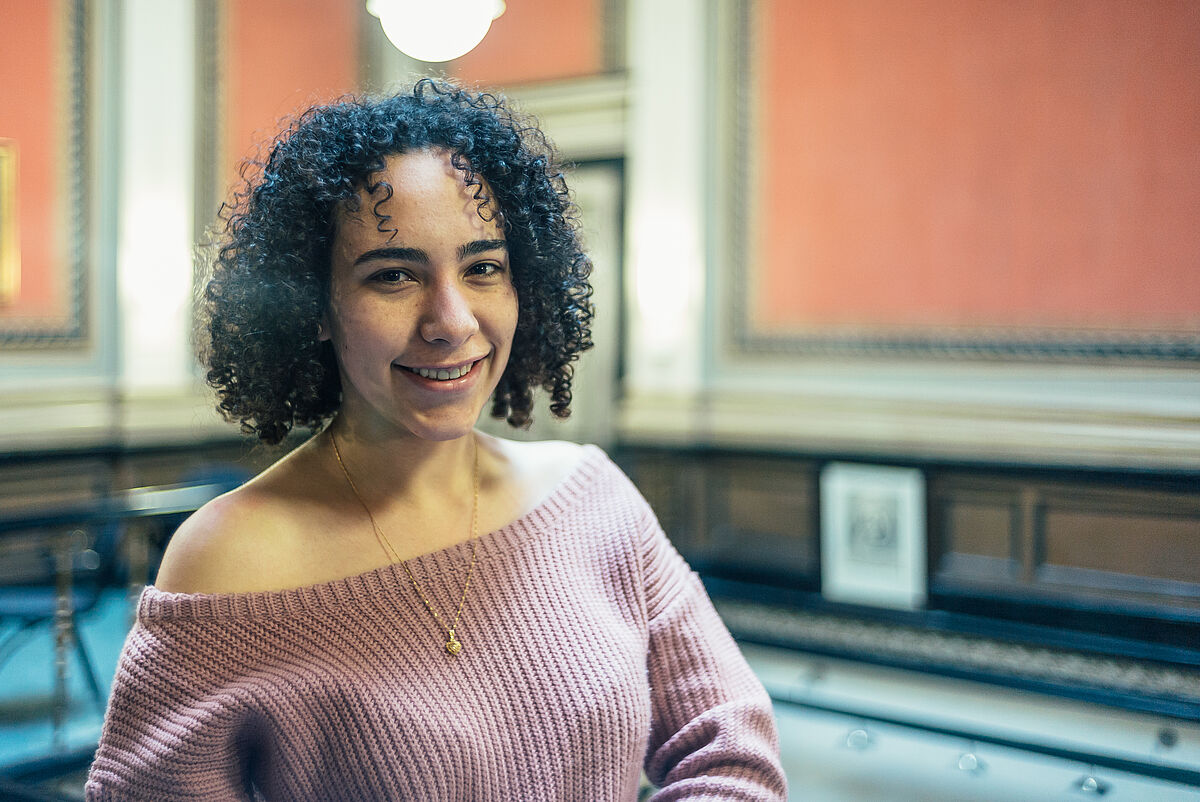
Sara Qarqash was born in Syria and lived there until she was 16. She fled with her family to Jordan in 2012 due to the ongoing war in her home country. The student came to Greifswald in 2015. She had previously taken part in a ten-month German course at the Goethe Institute in Jordan’s capital, Amman. Sara is currently studying her third subject-semester of Human Medicine in Greifswald. She gained the required prerequisites by successfully completing a preparatory course at the Studienkolleg. This gave her the chance to further extend her excellent German language skills. The Studienkolleg (Preparatory Courses) made it possible for Sara Qarqash to attain her goals and looked after her well.
Due to her excellent study achievements, Sara Qarqash also works as a tutor in the preparation course in anatomy. Here, she helps students in the first and second subject semesters with preparations. Sara also works as a care support worker at the University Hospital in order to gain experience at the hospital. Here, she looks after patients. ‘For example, I help patients with dementia during their daily wash. The job gives me a good insight into work at the hospital and provides me with the opportunity to establish bonds with patients, I think that’s important.’ Furthermore, during her first year of study, she also translated and interpreted for refugees at the Jobcenter and at the University Hospital.
Sara is very open towards and interested in other people and languages. For example, she spent Christmas and New Year 2015 with a family in Greifswald. The young medicine student got to know the family on facebook, which welcomed her with open arms. A close relationship has since developed, the student now visits the family once a week. ‘We go to the beach in summer and have already been on holiday together in Ireland. As my own family is so far away, it is a comforting feeling to have people who care nearby. I am so grateful to the family for their kindness,’ she says. In addition to her native language, Arabic, Sara Qarqash also speaks English and German.
Yang-Leng Liu stood out from the other 16 applicants. Yang-Leng Liu is studying Scandinavian Studies and Philosophy in Greifswald with periods of study abroad in Norway and Sweden. Ms. Liu is a very talented linguist and shows consistency and persistency. In addition to her native languages Taiwanese and Mandarin, Yang-Leng Liu also speaks English, Swedish, Norwegian and Icelandic, to name just some. When she was a young pupil, Ms. Liu set herself the goal of learning 30 languages, to be able to discover and understand the “world”.
“The DAAD Award means a lot to me, it is a brilliant feeling to know that my achievements have been acknowledged in Greifswald,” says Ms. Liu. Ms. Liu actually wanted to apply for the prize last year, but back then she was on a period of study abroad in Norway. She sees herself as a mediator, as someone who, thanks to her experience of different cultures, social and political environments, has the ability to bring people together and exchange peacefully. Her way of life and her experiences are now being consolidated on a philosophical front thanks to her choice of studies. Ms. Yang-Leng Liu is a role model for her fellow students in terms of internationality and open-mindedness.
International students were asked to apply for the annual DAAD Prize again this year. Faisal Farhan stood out from the other candidates. The Commission honours his exemplary actions: “Faisal Farhan is a role model for his fellow students and demonstrates how every individual can make a contribution to the internationality of the University of Greifswald”.
The prizewinner is successfully studying medicine in Greifswald. He is currently completing his practice year in University Medicine’s surgery department. Faisal Farhan has been involved in voluntary work for several years, alongside his demanding course of study. “It is my goal to be a role model for other international students and to show that you can still achieve good results in spite of the foreign language and get involved in social issues and voluntary work,” explains the prizewinner. Part of his voluntary work includes his work as an interpreter. The student translates for asylum seekers at public authorities and for Arab patients at the hospital. “Most Arab patients can speak neither German, nor English. Establishing the patient’s medical history and the first contact between the patient and the doctor are difficult. They cannot describe the pains that they have, where they are and when the pains started,” says Faisal Farhan. He teaches Arabic to fellow students who are interested. The prizewinner is a member of the Yemeni Student Association in Germany and Chairman of the Yemeni Association of Mecklenburg-Vorpommern. In this function, he supports new students in Greifswald. He shows them the town, helps to find them accommodation and is their point of contact for questions or problems.
